Other articles on similar
subjects
are published in English
in the
Offline
column
|
 |
1.
Ten years |
|
|
There has been electronic networking for over thirty
years. But there was a change ten years ago. In 1994 internet
access became available to a large number of people in
several countries – and more so in 1995. At the same time the
world wide web, that was born in 1989, was spreading to
general use (that is why many people, who came online ten
years ago or later, don’t understand the difference).
It’s not exactly true that there were computers two
thousand years ago, though scientists and philosophers had
elaborate computing machines (see The
Archimedes computer). They also had remarkably effective
communication networks at that time, but they were available
only to a few privileged people – and they were much slower
than the systems we are using now.
It’s a fact, however, that the internet didn’t
“happen” in a very short time. The concept that
led to the web as we know it now could be found in ideas that
were developing in the nineteenth century –
and it was specifically defined sixty years ago.
The process that shaped the internet was the result of an
evolution that dates back to the invention of the telegraph
in 1844 and the telephone in 1877. But things take time.
Though there were Usenet newsgroups in 1979 (and they are
still quite busy twentysix years later) most people had no
idea of what the internet is, or can do, before 1995.
There is no point in being nostalgic. Though it’s a fact
that the net was in many ways more efficient, and faster, in
the early Nineties than it is now. There is no need to go
back to Gopher and Veronica, or to “anonymous
FTP”, because we can use web
browsers also to find things that aren’t in websites.
There is much more stuff online that there was ten or twenty
years ago and it’s (relatively) easier to find. But there is
also a lot of messy clutter – and some of the clumsily
applauded technical “improvements” are making
things less manageable and often quite disturbing.
In mid 1995 there were eight million internet hosts
worldwide. In that year they grew from one to two million in
Europe. Small numbers compared to what they are now, but much
larger than a few years earlier. Some analysts thought that
hostcount would eventually stabilize at a “roof”
between forty and fifty million as a world total, around ten
million in Europe. Others were projecting an enormously
exaggerated “exponential” growth. They were all wrong.
In 1995 the number of people worldwide using the internet
(or other networks) was probably 30 million. The world’s most
applauded “experts” were sure that there would be a
billion people online before year 2000. It didn’t happen.
Recent estimates claim over 900 million in 2005, but a more
realistic definition is somewhere between 500 and 600
million. That’s a lot of people, but only eight or nine
percent of the world’s population – and mostly concentrated
in a relatively small part of the planet. Networks are large,
but not really “global”.
Even before 1995 there were many attempts to control,
censor, centralize and otherwise “tame” the
internet. They haven’t succeeded, but they are continuing.
Problems such as spam and
scam were clearly identified well before 1995, but nobody
believed, ten (or five) years ago, that they could become as large
and vicious as they are now.
Figures, of course, don’t tell the whole story. But it
may be useful to take a look at what happened in a decade.
Let’s start with a trend that is analyzed in greater detail
in the data section. This is
the growth of worldwide hostcount from 1994 to 2004.
Internet
hosts worldwide –
1994-2004
numbers
in millions
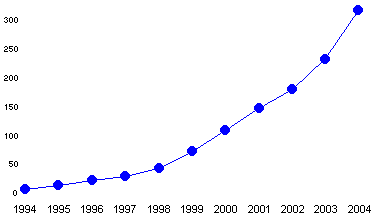
It isn’t “exponential”, but it’s remarkably
fast. There were changes in speed, but only in 2002 there was
less than 30 percent yearly growth.
The next graph shows development in Europe in the same period.
Internet
hosts in Europe –
1994-2004
numbers
in millions
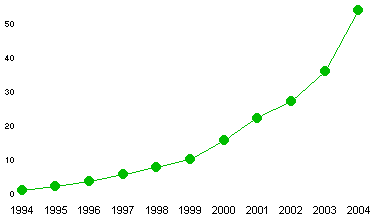
A few years ago growth in Europe was slower than
the world average, but now it’s faster (see
European data.)
A somewhat different picture is shown by the number of
websites – that in 2005 is getting close to 70 million.
Websites
worldwide –
1995-2005
numbers
in millions
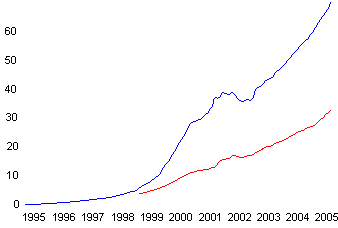
After a decrease in 2001-2002 caused by the deflation of
the financial “bubble”, there is strong growth also
in the number of websites. But less than half of the sites
are found to be “active” – and that shows that
there is still a rush at “being there” without a
clear idea of why, or to do what, or how to keep a website
alive and productive.
It’s much more difficult to find reliable data on the
number of people using the internet. This graph is a very
vague approximation of what the trend may have been in the
last ten years.
People
connected to the internet worldwide
1994-2004
numbers
in millions
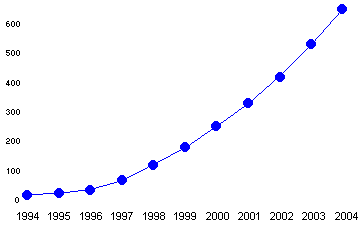
A more realistic estimate is probably 40 percent lower.
In those countries (e.g. in western Europe) where there is
higher density of internet use growth was slower in recent
years than in 1995-2000 – while it’s faster
in some of the areas where levels are relatively lower. But
numbers are increasing whenever internet use is not forbidden
or restricted. There is no perception anywhere of getting close
to a “saturation level”, though of course where
percentages of population are very high there isn’t
much room for a further large increase of the total number
of people using the net, if only occasionally.
But the sheer number of “internet users”,
doesn’t tell us what they are doing with it. Of course there
are considerable opportunities for improvement of quality. That
depends on how people learn to tailor the net to their needs
– as well as on the quality of what they can find.
A decade may be a long time in the life of a person, but
it’s a short period in the development of human culture.
Even people who have been online for fifteen or twenty years
still have a lot to learn – if they haven’t lost
their wish to search, find and improve. More new things
come online every day than anyone can possibly explore.
Unfortunately there is a lot of rubbish, but there are, and
there will be, also attractive new discoveries.
back to top
|
 |
2. How
many online |
|
|
No updates are available, so far, since the hostcount
analyses for year-end 2004 were published in the
international and
European data pages.
But it may be interesting to look at the
situation in a different perspective.
Estimates of the number of people using the internet are
always approximate, not very reliable, and often exaggerated.
International comparisons are even less believable, because
of differences in the definition of “internet
users”. However the general picture helps to understand
how unbalanced the situation can be in different parts of the world.
(For a more detailed analysis see international
user data – the text is in Italian. but the
graphs can be easily understood regardless of language).
According to a collection of data from several sources,
published by Internet Word Stats, this is the situation in
the twenty countries worldwide with the largest number
of “internet users” in 2005.
People online in 20
countries
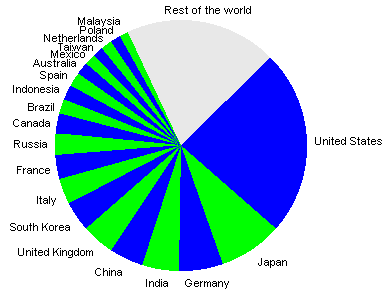
The next graph shows density, as a percent of population,
in the same countries.
(Percentages here, as in the following world
map and European density graph, are based on an overextended
definition of “internet users”. A more realistic estimate
is somewhere between half and two thirds of these figures).
People online in 20
countries
percentages
of population
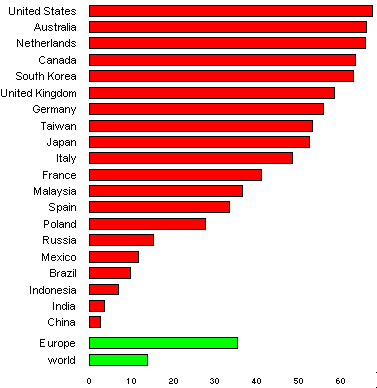
There are, of course, several high-density countries not
included in this list – and many with low internet
penetration. A general idea of the situation worldwide can be
summarized as a map.
People online per
100 inhabitants
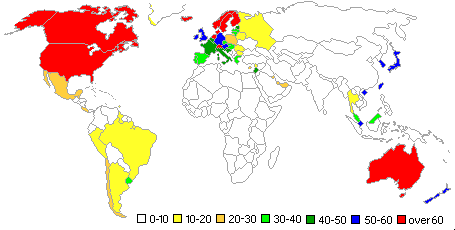
The numbers are different, but the worldwide picture
shows the same pattern as in the hostcount map (see
issue 74 or the
international data analysis).
People online are mostly concentrated in a few parts of the world.
The next graph shows the situation in the twenty European
countries with the largest number of people using the
internet.
People online in 20
European countries
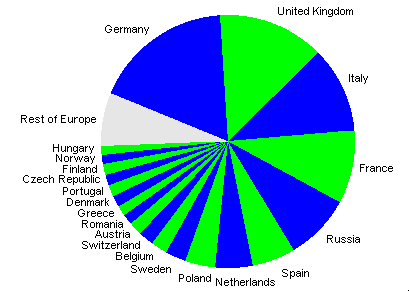
Half of the European total is in four countries. Recent
trends suggest that France may be on its way to overtake
Italy as the third largest country in Europe by number of
“internet users”.
This is the picture, for the same twenty countries, as a
percentage of population.
People online in 20
European countries
percentages
of population
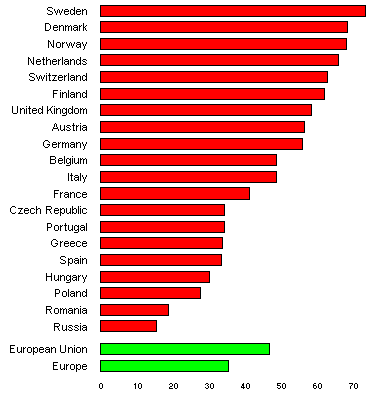
As in the case of hostcount data, Scandinavian countries
hold the leading position that they had ten or more years ago
– more recently the Netherlands and Switzerland have
been growing to those high levels.
According to other sources, the number of people online in some
major European countries had slow growth in recent years. That
does not mean that a “threshold” has been
reached, but further expansion will depend on cultural evolution,
quality of services available online, attitudes and information.
In most European countries, internet access is easily available
to anyone who wants it. But that doesn’t mean that everyone
is interested. A broad definition of “internet user” includes
people who have very different behavior patterns – some use
the net frequently, some only occasionally. And practically all
change their ways over time.
|
 |
3.
People online in Italy |
|
|
Most international readers aren’t particularly interested
in what is happening in a single country, such as Italy. But
I have more detailed information, and more accurate data,
especially for the last eight years, than for any other
country – and some of the trends are not very different from
what is happening in other places.
The picture hasn’t changed much since a summary of the situation
in Italy was published last year in issue
70 (a more detailed and updated analysis is in
Italian data).
The first graph shows the total number of people using
the internet in Italy from 1994 to 2004. (The numbers are
smaller than in the international comparisons, because the
data are less inflated and more accurate.)
People online in Italy
1994-2004
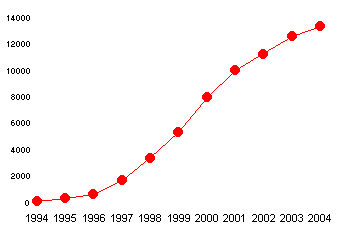
There was an acceleration in 1998-2000, while growth
was relatively slower in recent years.
This is the same trend separating office use from home.
People online in Italy
1994-2004
numbers
in thousands
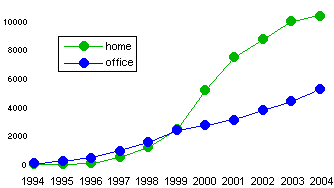
At all times before 1999 the internet was used mainly from the
workplace. Then there was faster growth at home, but office use
increased in 2003-2004 (and the trend continues in 2005).
The next graph shows a more detailed trend from 1997 to
the first half of 2005.
People online in Italy
1997-2005
numbers
in thousands
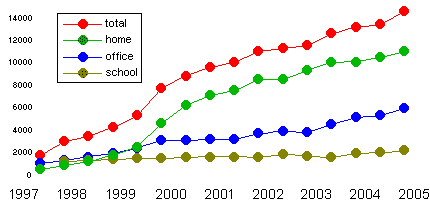
There are seasonal changes, especially in frequent use.
This graph shows the trend from March 2001 to June 2005 for
people who say that they use the internet “at least once
a week” (for the first time in April 2005 their number
exceeded ten million).
People online in Italy March
2001 – June 2005
numbers
in thousands
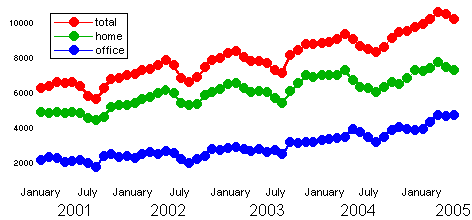
There seems to be an early summer decrease in home use in
2005, but the general trend shows growth – not as fast as in
1998-2000, but fairy consistent over time. From the
international comparisons available, similar patterns can be
found in other Western European countries.
Some analysts believe that the potential is about twice
the existing penetration. If current trends continue, that
level could be reached in the next five years. Then, we shall
see... but continuing development in the most advanced
countries indicates that there may be room for greater
growth, especially in frequency of use.
back to top
|
 |
4.
Internet non-users |
|
|
Will “everybody”, at some time in the future,
use the internet? Forecasts and projections are nearly always
wrong. We simply don’t know what will happen five or ten
years from now. But, at the present state of affairs, it’s
pretty clear that some people aren’t interested.
Obviously there are people who say «I don’t know
how to use a computer and I don’t want to learn».
That may be true, sometimes, but more often than not it’s
an excuse. Over fifty percent of the people in Italy who own
a personal computer don’t use the internet (and there
are similar situations in other countries).
People with a low education level are rarely internet
users. Because they feel uncomfortable with the technology
(though many of them are using fairly complex equipment,
including home appliances and cell phones). But, above all,
because they lack the interest and the curiosity. Most of the
frequent internet users are people with above-average use of
other communication and information tools – including
newspapers and books.
Older people are below-average users of the internet. Not
all of them – there are people that started when they were
eighty years old and feel quite comfortable online. But,
while the number is increasing, there is still a small
percentage of internet users at ages 65 or higher.
The problem will be “automatically” reduced
when current users get older, but in countries with high (and
increasing) median age it’s a pity that too many
“senior citizens” are deprived of a tool that
is particularly suited for their needs. There should be better
planned efforts to improve this situation, starting with
elderly people at the higher education levels, who can
in turn persuade and guide others.
There are people who tried and gave up. Their first
experiences online were discouraging. Or maybe they started with
one way of using the net, then they lost interest in that particular
activity (as happens often with young people) and they didn’t
bother to find out that they could do other things online.
This problem will, to a large extent, solve itself spontaneously,
if and when people learn from friends, work needs or other
environment situations that they have a good reason to come
back online. But better information on what the net is and what
it can do would help to accelerate the process.
There are people who are scared. They read about scams
and viruses, stolen credit cards and money mongering, online
crime and unhealthy or misleading content... they view scary
movies and horror tv stories... etcetera... and they feel that
it’s safer to stay away. Good information on how to avoid
problems could help them to feel less uncomfortable.
There are people who simply aren’t interested. If they know
what the internet is, and still don’t want it, they are right. But
do they know? Or were they just put off by watching someone
doing things that they don’t like or don’t understand?
Of course it’s perfectly possible to live happily without
ever using the internet (or, for that matter, any other tool –
I know people who lead a comfortable life without ever learning
to drive a car).
There are senior executives and other high-ranking people who
would feel debased if they ever touched a computer (or any other office
equipment). They have secretaries and assistants who do it for them.
That’s fine – as long as they don’t bore us with
patronizing explanations of their confusing assumptions about the
internet (or write their opinions in newspapers and books, teach them
in universities, discuss them in conventions and television talk shows).
The growth of the internet isn’t just a matter of numbers.
It’s spreading unevenly, but pretty fast. In addition to making
access easily available where it isn’t, the real need is to spread
a better understanding of what the net really is – and how people
can tailor it to fit their needs, for work, education, information,
entertainment and communication.
Widespread access to the internet became available, for people
living in a “developed” and free environment, ten
years ago. Large as it has become, it’s quite young. Most
of its possible development is still ahead of us.
|
|